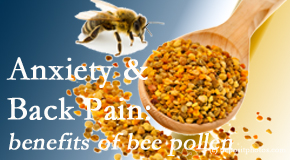Oxford Back Pain May Leave Your Cognition A Bit Fuzzy Bee Pollen May be of Help
Back pain can leave its sufferer feeling a bit foggy. Cognitive impairment and back pain go hand in hand for some. Cognitive impairment is not an issue you’d think “chiropractic,” but it is a topic your Oxford chiropractor thinks about as it’s seen in low back pain patients. Satterwhite Chiropractic watchfully observes our Oxford back pain and neck pain patients for their handling of the condition. Some are ok; others struggle a bit. We will be sure to help with any issues like this. New studies talk about bee pollen as being beneficial in helping.
COGNITIVE DYSFUNCTION AND BACK PAIN
Degenerative disc disease in the lumbar spine is an expanding concern globally as the world’s population ages. Dementia has been linked to lumbar degenerative disc disease due to physical dysfunction, quality of life, and pain. Particularly, one study reported that 41% of patients with lumbar spinal stenosis had mild cognitive impairment. (1) Short, simple screening tests and questionnaires can efficiently detect cognitive impairment. Once found, cognitive impairment may be challenged by interventions like cognitive stimulation and training, exercise, medications, and supplements which demonstrated some good effects on patients’ physical and cognitive function though not curative. (2) Chiropractic plays an integral role in back pain management. Satterwhite Chiropractic works to decrease the back pain with our Oxford chiropractic treatment plan in hopes of decreasing the cognitive dysfunction exacerbated by the stress of pain.
BEE POLLEN FOR COGNITIVE DYSFUNCTION, ANXIETY
Researchers explained chronic stress as a possible problem associated with anxiety, depression, and cognitive dysfunction. (Oxford chiropractic patients understand the stress that comes with spine-related pain!) With bee pollen’s therapeutic effects known to be related to its powerful antioxidant quality, a study of Anatolian bee pollen’s effect on depression and anxiety found that it lessened anxiety-like behavior in the study’s rats. The researchers explained that the bee pollen decreased oxidative damage and neuroinflammation produced by immobilization stress. (3) That’s a novel approach Satterwhite Chiropractic has not heard of often!
BEE POLLEN FOR COGNITIVE DYSFUNCTION
Bee pollen’s use in public health goes back into ancient times. The important health and medicinal properties make it a treasure trove of nutrition. Made of plant pollen and honeybee secretions and nectar, bee pollen contains bioactive compounds including proteins, amino acids, lipids, minerals, vitamins, polyphenols, and carbohydrates. Components of bee pollen are reported to enhance a variety of bodily functions and protect against many diseases. (4) One such disease is cognitive dysfunction. A recent report discusses the way by which bee pollen ameliorates cognitive impairment that is brought on by “cholinergic blockade.” How? It gets down to the cellular level which is a bit complex and explicable by an alphabet soup of proteins like proBNDF, tPa, ERK-CREB, Akt-GSK-3. Bottomline: The researchers end up suggesting that bee pollen would be a valuable agent for managing cognitive dysfunction. (5) Satterwhite Chiropractic presents findings like this as spine pain, back pain, neck pain, etc., are complex conditions involving many factors which frequently call for just as many different approaches like spinal manipulation, nutrition, exercise, rest, etc.
CONTACT Satterwhite Chiropractic
Listen to this PODCAST with Dr. Michael McMurray on The Back Doctors Podcast with Dr. Michael Johnson as he describes The Cox® Technic System of Spinal Pain Management integration to help with lumbar spinal stenosis.
Schedule your Oxford chiropractic appointment now. Back pain and the cognitive challenge it often triggers aren’t odd. Satterwhite Chiropractic offers many ways to combat both. Contact us today!

